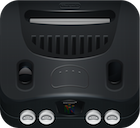
This guide will presume you have already installed the radare2 suite of binary analysis tools on your computer.
Radare 2 supports z64 big endian binaries using the r_bin plugin that comes preloaded with radare2, so you might need to convert your roms to this format if they are in v64 or little endian format.
For more information about N64 Rom File formats: List of Nintendo 64 ROM file formats - Wikipedia
First lets run radare2:
r2 ./biglevel.z64
Replace biglevel.z64 with the location of your own N64 ROM.
Now we want to analyze all the functions in the executable like so:
aaaa
Now we can get a list of all the functions found by Pressing v twice: 
Having all the functions named fcn.
It is common for developers to copy and paste sample code so lets see if we can match any sample code function names in this rom. TODO
So now you will be left with a bunch of game specific functions that can’t be renamed (unless you have a linker map file). So the real reverse engineering starts!
We need to use a mixture of radare2, emulator and memory editors to try to figure out what to call these functions.
We will never be able to get the original name of the function unless but by debugging the game in an emulator we can make good guests as to what they should be called.
One way to find out what a function does is look at the standard SDK functions it uses (thanks to the symbols we imported earlier).
If for example the function makes lots of called to Graphics libraries then you can be sure this function is used for rendering the game and so on.
The same applies for pretty much all standard APIs as it is unlikely developers will mix playing audio with saving the game to memory card for example.